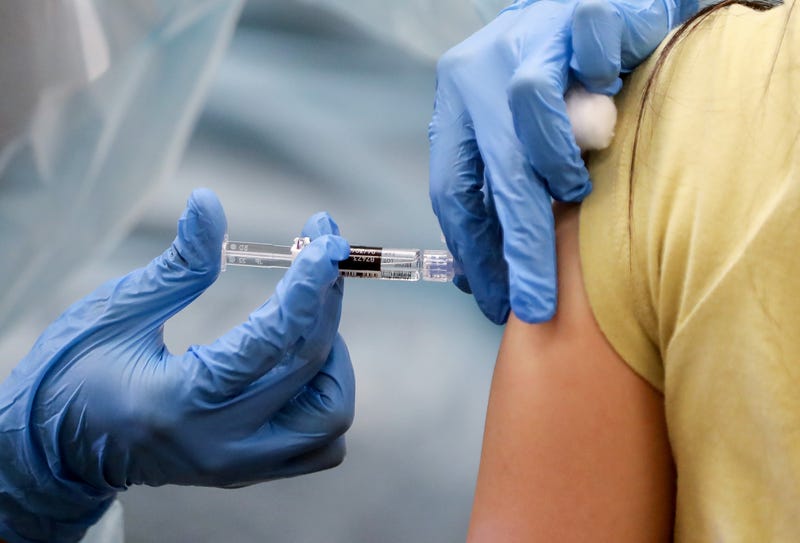
Buffalo, N.Y. (WBEN) - We're officially in the swing of things with the cold and flu season in Western New York, and recommendations are coming from local officials and medical professionals for folks to get their annual flu shot before the winter months arrive.
"Some wait until the dead of winter, but it's hitting earlier than normal right now, so don't wait for December, January, February - it's too late," said New York Gov. Kathy Hochul on Wednesday. "It's starting earlier. Right now, as of Monday, over three million New Yorkers have already had their flu shots. That's good. But our population's a little bit bigger than three million, so it's as easy as calling your doctor, walking into any pharmacy."

The flu season in New York made an earlier arrival than expected this year, with the expectations of case rates for the flu to rise more-and-more as the weather gets colder.
In order to avoid contracting and spreading sicknesses like the flu, COVID-19 and RSV, health officials are recommending:
- Washing your hands often with soap and hot water for at least 20 seconds to protect yourself from germs and avoid spreading them to others.
- Carrying an alcohol-based hand sanitizer to use when soap and water are not available. Choose a product with at least 60 percent alcohol.
- Do not cough or sneeze into your hands. Instead, cover your mouth and nose with a tissue.
- Staying home if you are sick.
- Wearing a mask that covers your nose and mouth if you are symptomatic.
While every year is a bit of a guessing game, when it comes to predicting the flu season, local health officials feel this year is probably going to be a difficult season for some.
"The reason for that is, people are no longer careful. They're no longer wearing masks, they're no longer demanding vaccination before they get together with other people," said Dr. Nancy Nielsen - Senior Associate Dean for Health Policy at the Jacobs School of Medicine and Biomedical Sciences. "I think we're going to go back to the situation where flu is going to be fairly rampant in the community. I won't be surprised if that happens, and the big takeaway from that is get your flu shot. No matter what your age, get your flu shot."
Although the three million flu shots so far being administered in New York State may be a good start, Dr. Nielsen says too many people who should be getting a flu vaccine every year doesn't. And especially as of late, Dr. Nielsen points out that many people aren't getting their flu shots simply because they're experiencing "vaccine fatigue".
"They're tired of all the COVID vaccinations and boosters, and the uptake for the new Bivalent COVID booster has not been nearly as good as it should be. So I think people are just, frankly, fatigued, but that fatigue shouldn't let people put themselves at risk," Dr. Nielsen said. "You can go to a supermarket and you can get your flu shot and your COVID booster the same day. It's just so easy."
Concerns were very prevalent last year near this time that the number of flu shots administered were down quite a bit, especially with people taking care of themselves with the different numbers of COVID-19 vaccines available. As the threat of COVID-19 has subsided, flu shot numbers may still remain lower than expected with people getting boosted for COVID.
"We know that the flu shot is not as effective against the influenza virus, as the COVID vaccine is against COVID. But we've known that, because the flu virus mutates every year, so it usually runs somewhere around 70% efficacy. With the COVID vaccine, it's in the 90s% of the efficacy," Dr. Nielsen explained. "There's nothing wrong with the vaccine, either one of them. People ought to take it and protect themselves, because, frankly, I don't see us going back to people wearing masks during the winter. That's when the viruses circulate. If you go to Asia in the winter, you are going to see people wearing masks. You don't see that here, so we'll see."
With vaccine fatigue also playing a factor, there are still plenty of people that don’t trust the COVID-19 vaccines, or maybe received their first round of shots and are not going to get a booster. So how does a medical professional like Dr. Nielsen talk to people about the flu shot and convincing them to get vaccinated?
"You'd never convince people to change their mind by demeaning them. That doesn't work and shouldn't be used. On the other hand, when facts are presented and people choose simply to ignore them, I don't know what you do, frankly," Dr. Nielsen said. "It usually involves someone who's trusted by that person who can have the conversation. Whether it's somebody in the community, a pastor or a priest, a good friend, it's a real challenge."
Dr. Nielsen also admits that members of the scientific community have to do a better job of communicating the truth with the public, especially following the days of constant developments and changes during the COVID-19 pandemic.
"Part of the problem was that in the early days of COVID, recommendations changed. But that's how science is. As we learned more, the recommendations changed," she said. "That shouldn't be regarded with the same impact is the 10 Commandments that you can't change or you're totally wrong."
There has also been hesitancy from people with regards to receiving mRNA vaccines to help better protect themselves from illness this cold and flu season. This has partly been due to concerns with people thinking it's new and hasn't been tested enough before being made available to the public. As Dr. Nielsen explains, that simply isn't the case.
"The mRNA technology has been studied, very well-studied in the laboratory for, at least 15, years. The University of Pennsylvania, Dr. Drew Weissman and his colleague probably will win the Nobel Prize for work that they did back 15 years ago," she said. "All of that basic bench research was done, and it was just a waiting, the need to use it. It's not that it's that new, and we've been stunned at how effective the mRNA vaccines have been, and how safe they've been."
When comparing the mRNA vaccine to the flu shot, the flu vaccine is reformulated every year, and is based on projections for what's happening elsewhere around the world.
"This is predictive, they try to predict what strains are going to be circulating in the community. Usually, the guesses are pretty good, so there is no reason not to get the flu shot," Dr. Nielsen said. "And again, not that we are telling people what to do, but that we are encouraging them to do what they need to do for their own safety. That's how I portray it. I wouldn't try to argue with anybody who has a belief system that ignores facts, that is never productive."
In addition, people have made the arguments for not getting the flu shot or a COVID booster, because they feel no matter what, they could still get sick with the flu or COVID-19. While Dr. Nielsen admits those people are correct with their thought process, she says it's all a matter of what safety means to a specific individual.
"Here's what you say: 'Do you want to be inconvenienced for a couple of days if you get it, or do you want to be in the hospital or in the morgue?' That's the choice you're making if you choose not to get vaccinated," Dr. Nielsen said. "It may not protect you from catching it, but it will keep you alive and out of the hospital. That's the important part."
More of our conversation with Dr. Nielsen is available in the player below:

